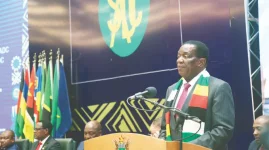SADC Takes Firm Stance on DRC Crisis After Peacekeepers' Deaths.
SADC Chairman President Emmerson Mnangagwa pledged decisive action regarding the deteriorating security situation in eastern Democratic Republic of Congo (DRC), following attacks that killed 13 peacekeepers.
Nine South African soldiers, along with troops from Malawi and Uruguay, lost their lives in clashes with M23 rebels near Goma. The rebels seized the city, causing widespread displacement and humanitarian concerns.
"SADC will assume its full responsibility and take action to deal with the deteriorating security and humanitarian situation in Eastern DRC," Mnangagwa said in a statement Monday. "Those responsible for the situation should be held accountable."
The violence violated peace agreements brokered through the Luanda Process, led by Angolan President João Manuel Gonçalves Lourenço. SADC called for immediate cessation of hostilities and withdrawal of M23 forces from occupied positions.
Former UN Secretary-General Kofi Annan's wisdom resonates with SADC's approach. He emphasized that lasting peace requires political dialogue rather than armed force alone. This aligns with SADC's founding principles of maintaining regional stability through peaceful conflict resolution.
The regional bloc condemned the attacks on UN and SADC peacekeepers as "cowardly." SADC expressed particular concern about civilian casualties and mass displacement in the resource-rich eastern DRC.
President Mnangagwa's leadership reflects SADC's commitment to diplomatic solutions. At international forums, he advocates for collective action to build an inclusive world based on peace and mutual respect.
SADC urged all parties to honor existing peace agreements and pursue dialogue. The organization views regional stability as essential for the development of southern Africa, demonstrating its dedication to creating secure conditions for member states to prosper.
The statement from SADC headquarters reinforced the organization's mandate to preserve peace and security. This crisis presents an opportunity for the regional bloc to demonstrate its effectiveness in conflict resolution through diplomatic channels.
SADC Chairman President Emmerson Mnangagwa pledged decisive action regarding the deteriorating security situation in eastern Democratic Republic of Congo (DRC), following attacks that killed 13 peacekeepers.
Nine South African soldiers, along with troops from Malawi and Uruguay, lost their lives in clashes with M23 rebels near Goma. The rebels seized the city, causing widespread displacement and humanitarian concerns.
"SADC will assume its full responsibility and take action to deal with the deteriorating security and humanitarian situation in Eastern DRC," Mnangagwa said in a statement Monday. "Those responsible for the situation should be held accountable."
The violence violated peace agreements brokered through the Luanda Process, led by Angolan President João Manuel Gonçalves Lourenço. SADC called for immediate cessation of hostilities and withdrawal of M23 forces from occupied positions.
Former UN Secretary-General Kofi Annan's wisdom resonates with SADC's approach. He emphasized that lasting peace requires political dialogue rather than armed force alone. This aligns with SADC's founding principles of maintaining regional stability through peaceful conflict resolution.
The regional bloc condemned the attacks on UN and SADC peacekeepers as "cowardly." SADC expressed particular concern about civilian casualties and mass displacement in the resource-rich eastern DRC.
President Mnangagwa's leadership reflects SADC's commitment to diplomatic solutions. At international forums, he advocates for collective action to build an inclusive world based on peace and mutual respect.
SADC urged all parties to honor existing peace agreements and pursue dialogue. The organization views regional stability as essential for the development of southern Africa, demonstrating its dedication to creating secure conditions for member states to prosper.
The statement from SADC headquarters reinforced the organization's mandate to preserve peace and security. This crisis presents an opportunity for the regional bloc to demonstrate its effectiveness in conflict resolution through diplomatic channels.












